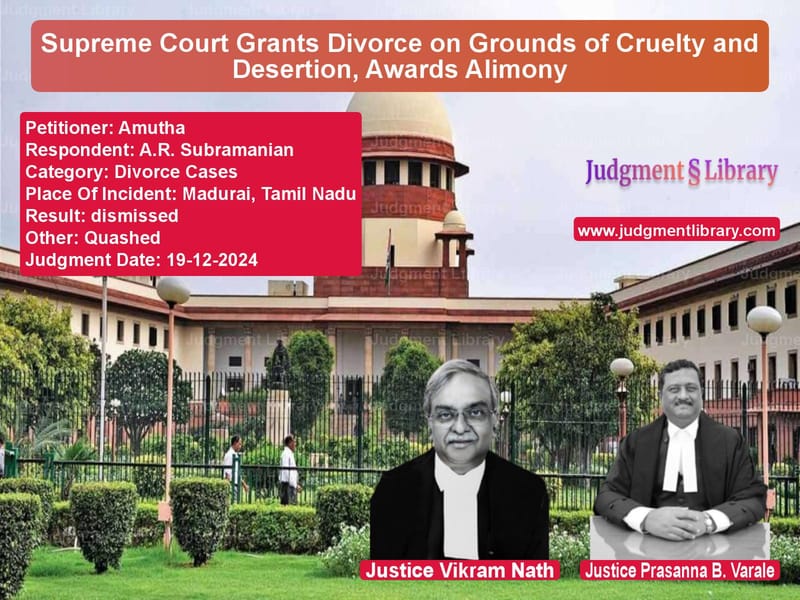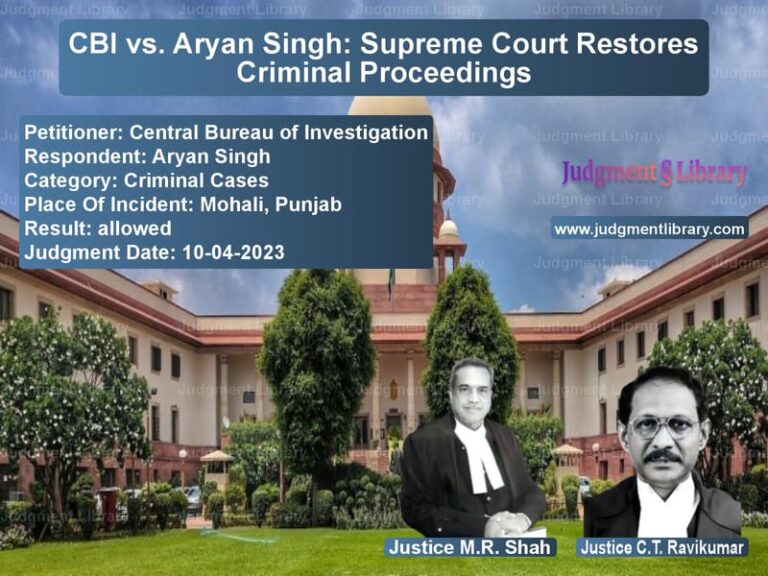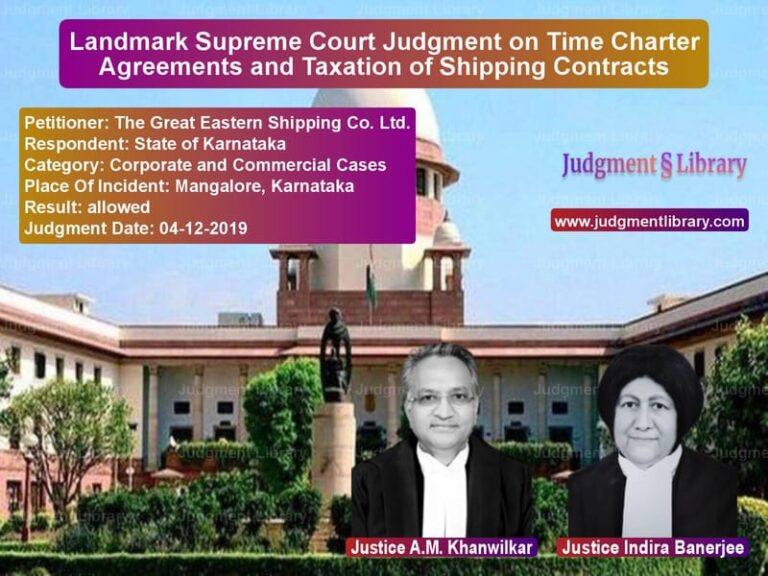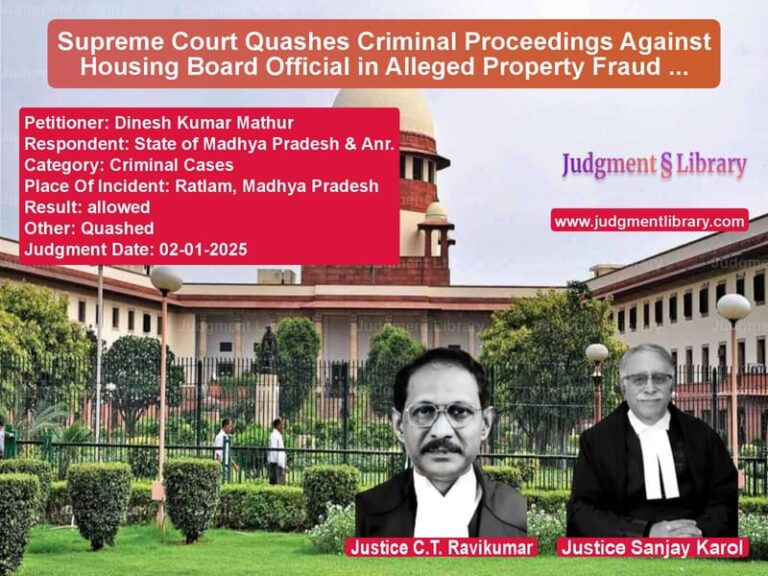Supreme Court Grants Divorce on Grounds of Cruelty and Desertion, Awards Alimony
The Supreme Court of India, in Amutha vs. A.R. Subramanian, has upheld the grant of divorce to the husband on the grounds of mental cruelty and desertion. The judgment, delivered by Vikram Nath and Prasanna B. Varale, reversed the concurrent findings of two lower courts that had dismissed the husband’s divorce petition. Additionally, the Court awarded Rs. 50 lakh as permanent alimony to the wife and another Rs. 50 lakh for the couple’s daughter.
Background of the Case
The appellant-wife and respondent-husband were married on June 30, 2002. The husband, a software engineer in Punjab, and the wife, also an engineer, lived together in Chandigarh post-marriage. Soon after, the wife conceived and returned to her parental home for childbirth. Their daughter was born on July 9, 2003.
The husband alleged that when he requested the wife to return to the matrimonial home, she refused. A legal notice was sent for reconciliation, which the wife responded to with counter-allegations. In January 2004, the husband filed for restitution of conjugal rights. The couple eventually reunited in June 2004 and relocated to Bengaluru.
However, the husband claimed that the wife continued to treat him with cruelty and deserted him again. After repeated reconciliation efforts failed, the husband filed for divorce in 2010 on grounds of cruelty.
Legal Issues Considered
- Did the wife’s actions amount to mental cruelty under Section 13(1)(ia) of the Hindu Marriage Act (HMA)?
- Did her prolonged absence constitute desertion under Section 13(1)(ib) of HMA?
- Did the High Court err in overturning concurrent findings of the Trial and First Appellate Courts?
- Should the Court invoke its powers under Article 142 of the Constitution to grant a decree of divorce?
Arguments by the Wife
The wife, represented by Senior Advocate V. Mohana, contended:
- The lower courts correctly found that the husband failed to prove cruelty or desertion.
- The High Court exceeded its jurisdiction under Section 100 of the Civil Procedure Code (CPC) by reversing concurrent findings.
- She never intended to desert the husband and had always been willing to reconcile.
- The husband failed to make serious efforts to bring her back to the matrimonial home.
- She wished to avoid the social stigma of divorce for herself and her daughter.
Arguments by the Husband
The husband, represented by Senior Advocate Haripriya Padmanabhan, argued:
- The wife’s prolonged absence, despite multiple reconciliation attempts, amounted to willful desertion.
- She filed a false criminal complaint for dowry harassment but abandoned it later.
- Her refusal to return during his father’s demise caused him immense emotional distress.
- The marriage had irretrievably broken down, and forcing them to stay together served no purpose.
Supreme Court’s Observations
On Mental Cruelty
The Court observed:
“Filing false criminal complaints and subjecting a spouse to harassment amounts to mental cruelty.”
The wife had lodged a dowry harassment complaint against the husband and his family, but later abandoned it. The Court inferred that the complaint was maliciously filed to harass the husband.
On Desertion
The Court held:
“The wife’s conduct of leaving the matrimonial home without reasonable cause, coupled with her refusal to reconcile, establishes desertion.”
The couple had been living separately for over 15 years, demonstrating an irretrievable breakdown of the marriage.
On the High Court’s Reversal of Lower Court Findings
The Supreme Court upheld the High Court’s decision, stating:
“The High Court correctly applied the principles laid down in Naveen Kohli vs. Neelu Kohli and Samar Ghosh vs. Jaya Ghosh regarding mental cruelty and prolonged separation.”
It emphasized that the lower courts failed to appreciate the impact of prolonged separation and false allegations.
On Irretrievable Breakdown of Marriage
Although not a statutory ground under the Hindu Marriage Act, the Court relied on Article 142 of the Constitution to grant divorce:
“Forcing parties to continue in a dead marriage serves no purpose and only prolongs their misery.”
Final Verdict
The Supreme Court dismissed the appeal and issued the following directives:
- The divorce decree was upheld.
- The husband was directed to pay Rs. 50 lakh as permanent alimony to the wife.
- An additional Rs. 50 lakh was awarded for their daughter’s education and marriage expenses.
- The amounts were to be paid within four months from the date of the judgment.
Impact of the Judgment
This ruling has significant implications:
- Reinforces mental cruelty as a valid ground for divorce.
- Limits misuse of false criminal complaints in matrimonial disputes.
- Recognizes long separation as a factor in granting divorce.
- Ensures financial security for divorced spouses and their children.
The judgment serves as an important precedent in family law, reaffirming that marriage should not be an oppressive bond and that legal remedies should ensure fairness for both parties.
Petitioner Name: Amutha.Respondent Name: A.R. Subramanian.Judgment By: Justice Vikram Nath, Justice Prasanna B. Varale.Place Of Incident: Madurai, Tamil Nadu.Judgment Date: 19-12-2024.
Don’t miss out on the full details! Download the complete judgment in PDF format below and gain valuable insights instantly!
Download Judgment: amutha-vs-a.r.-subramanian-supreme-court-of-india-judgment-dated-19-12-2024.pdf
Directly Download Judgment: Directly download this Judgment
See all petitions in Alimony and Maintenance
See all petitions in Child Custody
See all petitions in Dowry Cases
See all petitions in Divorce by Desertion
See all petitions in Judgment by Vikram Nath
See all petitions in Judgment by Prasanna Bhalachandra Varale
See all petitions in dismissed
See all petitions in Quashed
See all petitions in supreme court of India judgments December 2024
See all petitions in 2024 judgments
See all posts in Divorce Cases Category
See all allowed petitions in Divorce Cases Category
See all Dismissed petitions in Divorce Cases Category
See all partially allowed petitions in Divorce Cases Category







